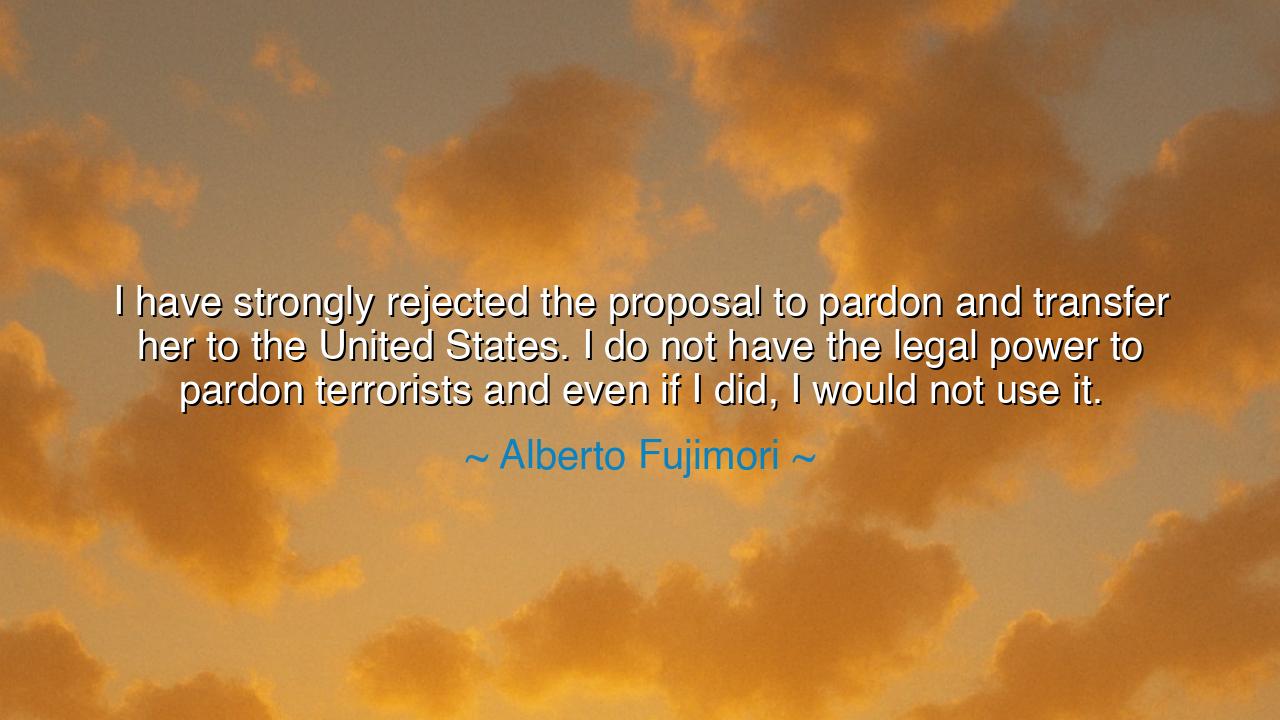
I have strongly rejected the proposal to pardon and transfer her
I have strongly rejected the proposal to pardon and transfer her to the United States. I do not have the legal power to pardon terrorists and even if I did, I would not use it.






When Alberto Fujimori declared, “I have strongly rejected the proposal to pardon and transfer her to the United States. I do not have the legal power to pardon terrorists and even if I did, I would not use it,” he spoke not as a mere ruler, but as a man standing at the crossroads of justice and mercy — a place where leaders throughout history have been tested. His words burn with the conviction of one who believes that law must not bow before sentiment, and that terrorism, the deliberate assault on innocent life, must never be excused under the guise of compassion. In this statement lies both the cold firmness of reason and the fiery burden of leadership: the understanding that to forgive too easily is to weaken the very pillars of civilization.
The origin of this quote lies in the turbulent era of Peru’s internal conflict during the late 20th century. As president, Fujimori faced the ruthless insurgency of the Shining Path (Sendero Luminoso) and the Túpac Amaru Revolutionary Movement, groups whose campaigns of terror left thousands dead, villages destroyed, and the nation paralyzed by fear. Among the captured insurgents was Lori Berenson, an American involved with the Túpac Amaru organization. Many in the international community pleaded for her pardon, framing her as a misguided activist rather than an accomplice in terror. But Fujimori stood unmoved. To him, such leniency would dishonor the memory of those who had perished — farmers, teachers, soldiers, and children — all slain in the name of ideology. His statement was both political and moral: a declaration that justice cannot be traded for sympathy when the crimes in question seek to destroy the peace of a nation.
Fujimori’s words belong to a lineage of leaders who have faced the agonizing question of whether mercy should ever extend to those who bring chaos upon the innocent. In ancient times, Solon of Athens and Cincinnatus of Rome wrestled with similar dilemmas. Solon once said that the law must “teach even the mighty to tremble,” and Cincinnatus, though revered for his humility, knew that certain acts were beyond pardon, for to forgive them would imperil the republic itself. Fujimori’s statement thus carries echoes of these ancient truths: that the power to pardon is sacred and must be wielded sparingly, for when justice is weakened in the name of compassion, the wicked grow bold, and peace becomes fragile.
There is also a deep humility in his admission — “I do not have the legal power to pardon terrorists.” In that phrase, Fujimori acknowledges the supremacy of law over authority. Though he held the highest office in the land, he confessed that even a president must obey the constitution and the will of justice. This recognition marks the difference between tyranny and lawful rule: the tyrant believes he is above the law; the just leader knows he is bound by it. Fujimori’s refusal to overstep his powers becomes, paradoxically, a sign of strength — for true authority is not in the freedom to act, but in the discipline to restrain.
Yet his second statement — “and even if I did, I would not use it” — reveals the core of his conviction. It is a declaration of moral firmness, an unwillingness to compromise with evil. To pardon the unrepentant terrorist, he suggests, would not be an act of mercy but a betrayal of the dead. It would signal to the world that the lives of innocents can be destroyed without consequence, and that nations can be swayed by pressure rather than principle. Fujimori’s defiance may have been controversial, but it carried a moral clarity that resonates across time: that justice, to be just, must sometimes stand unbending, even when the world calls it harsh.
His stance recalls the story of Marcus Aurelius, the philosopher-king of Rome, who once wrote that clemency must never be given to those who despise virtue. When Aurelius faced rebellion from his own general, he refused to forgive the act though his heart longed for peace. “I must defend the order of the world,” he said, “or the world will fall into madness.” In like spirit, Fujimori’s decision reflects the heavy truth that leadership often demands the sacrifice of personal feeling upon the altar of duty. To uphold justice is to bear the loneliness of those who cannot afford to be swayed by sentiment when the fate of the nation is at stake.
Let this serve as a lesson for all who hold power — whether in governance, in families, or in communities. Mercy without justice is weakness; justice without mercy is cruelty. But when mercy becomes a disguise for cowardice, and justice is demanded by the cries of the innocent, then the hand must remain steady. Fujimori’s words, though born of a time of blood and terror, remind us that the law must be impartial, even when the heart trembles.
And so, the teaching endures: hold compassion in one hand, but justice in the other — and when the two come into conflict, let reason guide the balance. For a nation that pardons its destroyers is a nation that condemns its protectors, and a leader who fears to uphold the law will soon find himself ruled by lawlessness. In the end, as Fujimori knew well, peace cannot be purchased through forgiveness of terror — it can only be earned through steadfastness in the defense of truth.






AAdministratorAdministrator
Welcome, honored guests. Please leave a comment, we will respond soon